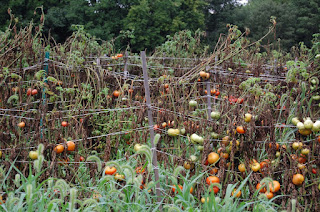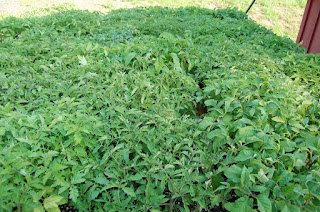I need to laugh, and when the sun is out
I've got something I can laugh about
I feel good, in a special way
I'm in love and it's a sunny day
Good day sunshine, Good day sunshine,Good day sunshine
While the sun may have been out more recently than not, Farmer David, and other organic farmers, are still reaping the adverse consequences of all of the rain from previous months. Whether it is disease (basil downy mildew, late blight for tomatoes) or pests (bugs eating carrots or broccoli) or the rain, this has been a very challenging season. One of the consequences of the earlier rains is that certain crops are not presently available, or available in less quantity than would otherwise be the case. People might think that the current drier weather means that all produce should be available. The reality is that the earlier rain wiped out plantings of certain things or prevented the planting of others. So, sadly, just because it is drier now, the damage has been done.
Despite all of this, Farmer David, and other local organic farmers, persevere. While they are obviously not thrilled with what Mother Nature has thrown at them, they accept that the various conditions come with their chosen profession. Perhaps profession is the wrong word. People who choose to go into farming, particularly those who have chosen to be in organic farming, don't view what they do as a job. It is who they are. The reasons that bring a person to farming are many and varied, but the bottom line is that they believe in what they are doing. They have a commitment to what they are doing. Farming is not the type of 'job' that a person can just show up for, go through the motions, and go home at the end of the day. Farming requires a passion for a lifestyle that continually challenges a farmer's resolve. It has been said in this blog before, and it will be said again in the future, when you go to a farmers' market, thank the farmer at whose stand you shop.
The term 'local' has been used frequently in this blog. The context of this has been to promote the notion of the smaller scale farmer who sells their produce within a relatively short distance from where the food is grown. The implication of this is that the closer to home the produce is the fresher it will be for the consumer and the less the carbon footprint will be in bringing the produce to market. This is a concept that over the past few years has become increasingly popular. An article by Kim Severson in the NY Times (May 13, 2009) addresses the issue of what happens when large companies start to promote themselves as embracing the notion of 'local'. It is an interesting article the examines what it does mean to be local and how large companies are trying to use people's belief in the concept to promote their own interests. To read the article go to- http://www.nytimes.com/2009/05/13/dining/13local.html?_r=1&scp=1&sq=When Local Makes It Big - Kim Severson&st=cse
Another suggested article, this one by Michael Pollan. The article is adapted from his introduction to Bringing It to the Table, a collection of Wendell Berry's writings. Wendell Berry is someone who, in the early 1970's, began to write about the importance of food and agriculture in American culture. To read the article go to- http://www.thenation.com/doc/20090921/pollan
Regardless of your thoughts about the meaning of 'local', there is a difference between those farmers who are connected to large corporations and those farmers who operate on a much smaller and much more local level. When possible support your smaller, local, sustainable, and organic farmer. And if the notion of organic is not of large importance to you, buying from local farmers is still a great thing to do.
Peace and good, healthy eating to all.
While the late blight was devastating to the tomato plants, Farmer David was able, for a brief period, to bring an array of tomatoes to market. While the variety may not have matched what was available last season, they were wonderful and colorful. Here's to a better season next year.

Ah, the beauty of nature.

Asian eggplant- less seedy, more creamy, and with less of the traditional eggplant bitterness. And they are gorgeous.

Just your basic, traditional red onion. Tasty raw, wonderful sweet when sauteed.

This is what happens when a farmer spends too much time under the hot sun.

Better watch out for those speeding tractors.

Hope to see you at market. And if unable to come to one of Gravity Hill's markets, run, don't walk to the farmers' market closest to you. Peace to all.













































